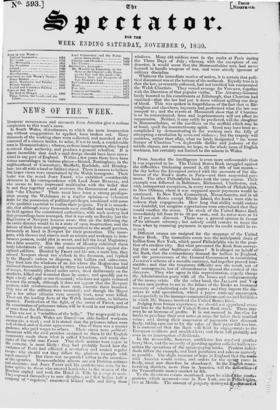NEWS OF THE WEEK.
DOMESTIC Occurrences and accounts from America give a serious complexion to this week's news. In South Wales, disturbances, to which the term insurrection may without exaggeration be applied, have broken out. Many thousands of the working class were collected, and marched at the command of a chosen leader, to seize, if not to sack, a considerable town in Monmouthshire ; whence, as front head-quarters, they hoped to extend their authority, and produce a general rebellion. It is almost incredible that such a mad design should have been entertained in any part of England. Within a few years there have been riotous assemblages in various places—Bristol, Nottingham, in the neighbourhood of Canterbury, Sheffield, Rochdale, and Birmingham: but all with a local or limited object. There is reason to believe that larger views were entertained by the Welsh insurgents. Their leader was the noted JOHN. FROST, who exhibited considerable cleverness in his correspondence with Lord JOHN RUSSELL, and who seems to have impressed multitudes with the belief that he and they together could overturn the Government and establish "tile Charter." There must have been a strong predisposition among the 'Welslunen to a similar opinion—a vehement desire for the possession of political privileges, combined with sonic of the qualities essential to realize their projects. For it is remarkable, that although many thousands were enrolled and ready to take the field against the constituted authorities, with such secrecy had their proceedings been managed, that it was only on Sunday last the Magistrates of Newport became aware that on the following day the entire district would be in a state of open insurrection, and the defence of their lives and property committed to the small garrison, fortunately at hand in Newport for their protection. The insurgents, with thewes and sinews such as miners and workmen in ironfurnaces possess, could plot in secret, and lull the local Magistracy into a false security. But the events of Monday exhibited these hardy inhabitants of mines and mountains powerless against disciplined soldiers. Headed by FROST and his son, a mere boy, they entered Newport about ten o'clock in the forenoon, and replied to the Mayor's orders to disperse, with bullets and sabre-cuts. They fired into the windows of an inn where the Magistrates had stationed themselves, guarded by thirty foot soldiers. This handful of troops, favourably placed under cover, fired deliberately on the assailants, killed and wounded them by scores, and speedily put to flight a body of eight or ten thousand; who have not again ventured to renew the attack, although it does not appear that the Newport garrison, with reinforcements since sent, exceeds three hundred. Oily two of the military were wounded ; and though the Mayor and a few other citizens were severely hurt, none were killed. 'these are the leading facts of' the Welsh insurrection, as hitherto reported. Particulars of the fight, of the arrest of FROST, and of' the examination of prisoners taken, will be found in our compilation of news from the Provinces.
This was not a "rebellion of the belly." The wages paid in the iron-works of South Wales are liberal—an able-bodied workman earning 22a. a week ; and it is stated that the prisoners taken were well clothed and of decent appearance. One of them was a master gardener, who paid wages to others. Their views were political : thscontent with the civil position assigned to them in the English c.ommunity made them what is called Chartists, and ready disciples of the wild man FROST. That their notions were vague in the extreme, is most likely : they had probably heard how the workmen of Penis had effected a revolution and routed regular
troops why should nut they follow the glorious example with
equal success ? 1.3ut there was no parallel either in the occasions or the agencies. Monmouthshire miners are not Parisian artisans and sto(ients ; and JOHN ntOST and his confedentes were far inferior sprits to those who enacted barricades in the streets of the p,,ourbon capital and took the I& lk de Ville hy a coy de main. I hey exposed themselves to sure slaughter, and fled belbre half a mai )an,7 of " regulars," ensconced behind walls and firing from windows. Many old soldiers were in the ranks at Paris during the Three Days of July ; whereas, with the exception of one deserter, it would seem that the Monmouthshire men had never learned to handle weapons of war, and were utterly ignorant of military discipline.
Whatever the immediate motive of action, it is certain that political discontent was at the bottom of the outbreak. Equally true is it that the law, so recently enforced, had not terrified but exasperated the Welsh Chartists. They vowed revenge for VINCENT, together with the liberation of that popular victim. The Attorney-General lately boasted to his constituents at Edinburgh, that Chartism had vanished—that the law had put it down without spilling one drop of blood. This was spoken in forgetfulness of the fact that at Birmingham and elsewhere, bayonets had performed what the law was unequal to ; and the events at Montnouth show that if Chartism is to be exterminated, fines and imprisonments will not effect its suppression. Neither, it may safely be predicted, will the slaughter in Monmouthshire, or the sacrifices on the scaffold which may be at hand, quell the insurrectionary spirit. Good may have been accomplished by demonstrating to the working men the folly of attempting a revolution by arms and violence; but the tragedy will embitter, rather than allay, what we lately designated " the worst feature of Chartism "—a deplorable dislike and jealousy of the middle classes, not common; we hope, to the whole mass of English workmen, but certainly not limited to the miners in Wales.


























